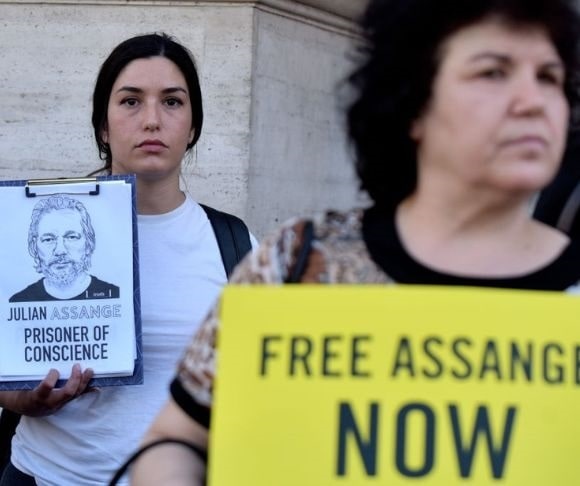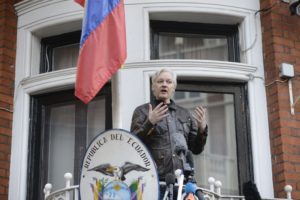
(Photo by Simona Granati – Corbis/Corbis via Getty Images)
There is perhaps no more controversial character than Julian Assange. Labeled an international thief by some and a righteous whistle-blower by others, the WikiLeaks founder was tapped as Time magazine “Person of the Year” in 2010. However, his fall from grace has been nothing short of staggering. Now he faces 18 federal counts in connection with publishing classified documents that the US claims violated its laws.
Hacker Extraordinaire
 Assange originally faced allegations of sexual assault in Sweden which were later dismissed. But during that time, Ecuador granted the well-known hacker asylum. Holed up in the Ecuadorian Ambassy in London from 2012 to 2019, his asylum was eventually rescinded.
Assange originally faced allegations of sexual assault in Sweden which were later dismissed. But during that time, Ecuador granted the well-known hacker asylum. Holed up in the Ecuadorian Ambassy in London from 2012 to 2019, his asylum was eventually rescinded.
During Assange’s stay at the embassy, his organization managed to publish thousands of Hillary Clinton’s emails as well as those of the Democratic National Committee (DNC). In 2016, a UN panel determined the Wikileaks founder had been deprived of his liberty and recommended his release. But the Brits considered that recommendation as “non-binding” and promised he would be taken into custody should he leave the Embassy of Ecuador. The UK followed through with their threat and Assange has been incarcerated there ever since.
In the meantime, US officials have been angling to get their hands on Mr. Assange and unless an appeal by his attorney’s succeeds, he will cross the pond to American shores. The eighteen charges awaiting him here in the US including breaching the Espionage Act and conspiracy to hack government computers. If convicted, Assange could face up to 175 years in prison.
Assange and his legal team have long held that his publishing of classified documents is the work of an investigative journalist. “This is disappointing news that should concern anyone who cares about the First Amendment and the right to publish,” asserted Barry Pollack who serves as Mr. Assange’s attorney. But government officials see WikiLeaks, and thus Assange, by extension, as nothing more than that of a criminal. In a statement regarding his impending extradition, WikiLeaks defended its founder:
“The path to Julian’s freedom is long and tortuous. Today is not the end of the fight. It is only the beginning of a new legal battle.
“We will fight louder and shout harder on the streets, we will organize and we will make Julian’s story be known to all.”
A federal grand jury in the Eastern District of Virginia issued three indictments against Mr. Assange.

Julian Assange (Photo by Constantin Eckner/picture alliance via Getty Images)
The WikiLeaks founder is accused of aiding former U.S. Army intelligence analyst Chelsea Manning in “cracking” the password to Defense Department computers. Yet another count relates to “conspiracy to commit computer intrusion,” and another claims that by releasing classified cables, Assange put a number of American assets in Iraq, Afghanistan, China, Iran, and Syria in harm’s way.
The Free Speech Battle
Fans of WikiLeaks and Julian Assange claim he has been ruthlessly persecuted for acting as a journalist. They assert the publication of documents and exposing of government secrets is in the public interest. But critics maintain his actions violate US law and that he should be criminally prosecuted. Asst. U.S. Attorney General for National Security, John C. Demers, has stated, “Julian Assange is no journalist.”
Thus, the case of Mr. Assange’s coming to America is likely to be filled with all manner of controversy. Should the extradition appeal fail, he will be forced to appear in an Alexandria, VA, courthouse in front of District Judge Claude M. Hilton.
Remember to check out the web’s best conservative news aggregator
Whatfinger.com — the #1 Alternative to the Drudge

